In Post-9/11 World, US President Has the Loneliest Job
In Post-9/11 World, US President Has the Loneliest Job
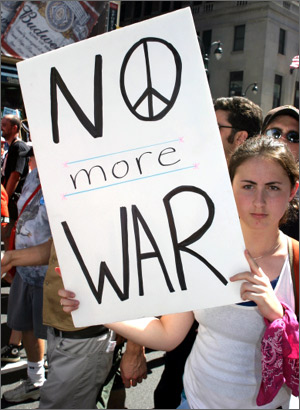
WASHINGTON: The recent call for the ouster of Iraqi Prime Minister Nouri al-Malaki by leading Democratic presidential candidate Senator Hillary Clinton, echoed a drumbeat of similar demands from neoconservatives in the US – suggesting that, whoever wins the 2008 presidential election, Americans’ belief in their right to interfere in the affairs of others remains remarkably undeterred by the fiasco of the Iraq War and an explosion of anti-Americanism around the world.
Americans who assume that the world’s people will revert to loving the US and its policies once George Bush leaves office must think again.
Clinton, Rudy Giuliani and other principal Democratic and Republican contenders for the White House are out of step with the global public when it comes to a range of foreign policies. Presidential aspirants have pledged to continue the war on terrorism, the struggle in Afghanistan and the promotion of American values, especially US-style democracy.
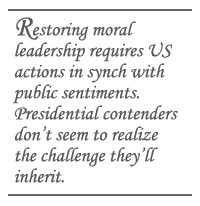
The next president will undoubtedly enjoy a public-opinion honeymoon of sorts, reflecting widespread anybody-but-Bush sentiment. But restoring America’s moral leadership around the world not only requires a new president, but also US actions in synch with public sentiments. Current presidential contenders don’t seem to realize the challenge they will inherit.
Anti-Americanism is at an all-time high. The recent Pew Global Attitudes survey – a poll of 45,000 in 47 nations – underscores the uphill climb facing the next US president.
This year, favorable ratings of America are lower in 26 of 33 countries for which Pew has comparable data going back to 2002. Support declined across the world: in Germany, Mexico, Brazil, South Africa, China, India and Japan. In Britain, for example, long Washington’s staunchest ally, only 51 percent now supports the US, down from 75 percent in 2002. In Turkey, another NATO ally, support is at 9 percent, the lowest in the world.
The unpopularity of President Bush and the Iraq War are clearly to blame. In 37 nations, majorities claim little or no trust in Bush to do the right thing in world affairs, and at least half of those surveyed in 42 countries say the US should remove troops from Iraq as soon as possible.
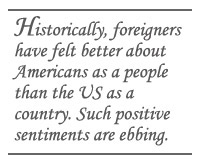
Historically, foreigners have felt better about Americans as a people than about the US as a country. Such positive sentiments remain, but are ebbing. Since 2002, opinions of Americans as individuals declined in 23 of 33 countries where trends are available. However, majorities in most countries still like Americans, giving the next president something to build upon, depending on how she or he deals with other irritants fueling the anti-American backlash around the world.
All leading GOP and Democratic presidential contenders promise to combat terrorism vigorously.
“There is a war [on terror] going on,” candidate Mitt Romney said in the June Republican debate, “and we need a broad response.” His views echo those of Giuliani, his principal Republican rival, whose website avows that he “believes winning the war on terror is the great responsibility of our generation.”
But success could prove elusive if the public has lost faith in how this struggle is conducted. Support for the US-led war on terror is down in 29 of 33 nations. None of America’s western European allies back Washington’s efforts. Even in societies that had experienced recent terrorist incidents – including Spain, Morocco and Turkey – most oppose the US anti-terrorism campaign.
Since Al Qaeda is not about to go out of business, the next US commander-in-chief must develop a new anti-terrorism battle plan in conjunction with allies, or the US risks being seen as an obstacle, not an asset, in the world struggle with radical Islam.
All principal candidates are also committed to prosecuting the war in Afghanistan.
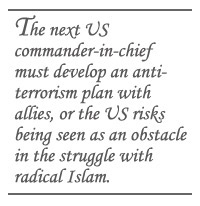
Senator Barack Obama promised in a June Democratic presidential debate that he would “focus on the battle that we have in Afghanistan. We have to finish the job.” Earlier, Clinton had called for an increase in troops in Afghanistan before the US Council on Foreign Relations. Not to be outdone, Republican contender Senator John McCain said in a December interview with USA Today, that, if necessary, he too would send more troops to Afghanistan.
But each of these Afghanistan hawks risks going it alone. In April 2002, 83 percent of the American people approved of the US military campaign in Afghanistan. Today, 42 percent want the troops pulled out as soon as possible. Of 12 countries surveyed that have troops fighting alongside the US in Afghanistan, only in Britain does a majority still favor keeping forces there. If Germany, Canada and the Netherlands withdraw troops, as their populations now demand, the next president must find some way to replace the 7,800 men and women these allies provide, a fifth of NATO’s total in Afghanistan. More important, the president must explain to voters why Uncle Sam is left holding the bag and why increasingly reluctant Americans should shoulder more of this burden.
Finally, all the candidates pledged to restore America’s moral leadership around the world. In the June Democratic debate, John Edwards contended that “the single greatest responsibility of the next president is to speak to the world about what real American values are.” He promised to spend his first 100 days in office touring the world to re-establish America’s moral authority. He has some explaining to do as the Guantanamo base festers and images of tortured Abu Ghraib prisoners remain fresh in peoples’ minds.
The global backlash against the spread of Americanism is broad and deepening. In 36 countries, majorities of the public, including three-fifths of the Indians, two-thirds of the British and Poles, three-quarters of Brazilians and four-fifths of the French and Turks, label American ideas spreading in their societies as a bad thing.
In particular, the survey reveals widespread opposition to the US-style democracy championed by the Bush administration and major presidential candidates for the Middle East and elsewhere.
“We want to continue to export democracy,” Clinton told the New Yorker magazine in January. McCain agrees. “The promotion of democracy and freedom is simply inseparable from the long-term security of the United States,” he said in a 2005 speech. Romney argues that democracy promotion is a key prong in his strategy to “defeat the jihadists.”
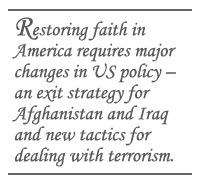
But American-style democracy is no longer a role model for the world. People in most countries Pew surveyed support basic democratic principles, such as competitive elections and trial by jury. But majorities or pluralities in most places report disliking US ideas about democracy. The contested US elections in 2000 in which the Supreme Court picked the winner did not help raise admiration for the American system. Rejection worsened almost everywhere since 2002, including a decline of 27 points in Venezuela, 25 points in Turkey and 23 points in Indonesia. People have lost faith in American democracy promotion because they believe Washington only pushes democracy when it serves US interests.
The next US president will inherit a tarnished America, a legacy of the Bush administration and Iraq, to be sure. But the problem also transcends that failed presidency and war. Restoring faith in America requires major changes in US policy – an exit strategy for Afghanistan and Iraq and new tactics for dealing with terrorism. New strategies must be built by listening to others around the world to rebuild trust in the US.
If Clinton, Giuliani and the others don’t understand this challenge, their presidencies risk foundering on the shoals of global public opinion, just as the ill-fated presidency of George W. Bush has done.
Bruce Stokes is the co-author of the book “America Against the World” published by Times Books.